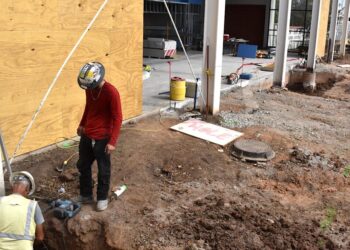Members of a county development authority say a 2021 decision to cut their funding has left the body with inadequate resources to support development.
The Comanche County Industrial Development Authority (CCIDA) strongly objected to a last-minute decision made in 2021 without their input to cut what had been $800,000 a year in revenue to about $200,000 a year. That cut is important because the industrial development authority was created to support industrial development across the county. Projects range from grants and loans to small businesses, to funding designated for the most recent Goodyear expansion, to designating 40 acres of property it owns in southwest Lawton and $1 million to Westwin Elements for a cobalt/nickel pilot plant.
During the board’s investment report last week, attorney Mike Mayhall said CCIDA has about $1 million of funding in two banks. It’s an amount that has a much slower rate of growth because the countywide sales tax allocated to CCIDA equates to about $16,000 a month, about 80 percent less than it received before the 2021 vote. At the time, county commissioners said they were changing the allocation formula to give more money to the Comanche County Detention Center to improve its budget.
CCIDA member Eddie Dabney, a Cache banker, said Comanche County’s 0.375 percent sales tax rate is low. The statewide average is 1.4 percent, making Comanche County’s rate the sixth lowest in the state, he said.
Authority members, who want to explore funding options, referred to a proposal Dabney made in May 2023. Then, Dabney advocated for a new quarter-percent county sales tax that could generate $330,000 per month, money he suggested be allocated to small towns, rural fire departments and CCIDA.
Dabney said last week while he understands the county had to get additional funding for jail operations, “that’s not what this body is all about.” He said the county’s smaller towns are facing significant issues, predicting urban sprawl from Lawton will overcome Elgin and Cache, and residents in those towns will, in turn, move to Fletcher and Sterling.
“As urban sprawl continues, the pressure is on small communities,” Dabney said, adding those small towns will have problems addressing the issues resulting from increasing population and CCIDA doesn’t have the money to help them address those issues because of its funding cut.
Mayhall said the authority must explore alternatives, noting the authority “will be doing nothing unless we get more money.”
Authority members acknowledged the City of Lawton won’t be in favor of the plan. Lawton’s total sales tax is 9 percent — half comprised of its sales tax; the remainder state and county tax — and city leaders have been firm in their stance they don’t want that total tax to exceed 9 percent because of opposition by retailers. Dabney said while he understands Lawton’s concern, “we need to take care of us.”
Authority member Fred Fitch said taking care “of us” means looking at a new funding source that will allow CCIDA to continue investing in economic development and small communities, but its options are limited.
Dabney said his quarter-percent proposal would increase costs modestly, estimating someone spending $20,000 a year would pay $50 more in new sales tax. In return, that tax could generate $450,000 a month under most recent estimates, funds that would benefit CCIDA, rural fire departments and small communities. He said the benefit to small communities and residents in unincorporated areas would be profound: for example, better funded rural fire departments with more equipment and personnel would decrease ISO ratings, which would lessen the cost of property insurance premiums.
Dabney used himself as an example, saying if his Pecan Valley neighborhood has the same ISO rating as Cache, he could cut his insurance premium in half. He also pointed to past CCIDA achievements, saying the board is helping with a project that could result in a $1 billion capital investment on a cobalt/nickel refinery.
“We did that,” he said of that new industrial development. “Without sales tax, this body does not have the money to do that.”
CCIDA Chairman Paul Ellwanger said while CCIDA needs to consider the issue, members must remember they are only a recommending body. Any decision about a new county sales tax would have to be made by the Board of County Commissioners.
Want to reach a local audience and grow your business?
Our website is the perfect platform to connect with engaged readers in your local area.
Whether you're looking for banner ads, sponsored content, or custom promotions, we can tailor a package to meet your needs.
Contact us today to learn more about advertising opportunities!
CONTACT US NOW




